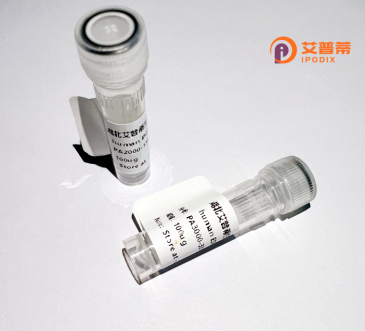
| 纯度 | >90%SDS-PAGE. |
| 种属 | Human |
| 靶点 | ZBTB39 |
| Uniprot No | O15060 |
| 内毒素 | < 0.01EU/μg |
| 表达宿主 | E.coli |
| 表达区间 | 1-712 aa |
| 活性数据 | MGMRIKLQSTNHPNNLLKELNKCRLSETMCDVTIVVGSRSFPAHKAVLACAAGYFQNLFLNTGLDAARTYVVDFITPANFEKVLSFVYTSELFTDLINVGVIYEVAERLGMEDLLQACHSTFPDLESTARAKPLTSTSESHSGTLSCPSAEPAHPLGELRGGGDYLGADRNYVLPSDAGGSYKEEEKNVASDANHSLHLPQPPPPPPKTEDHDTPAPFTSIPSMMTQPLLGTVSTGIQTSTSSCQPYKVQSNGDFSKNSFLTPDNAVDITTGTNSCLSNSEHSKDPGFGQMDELQLEDLGDDDLQFEDPAEDIGTTEEVIELSDDSEDELAFGENDNRENKAMPCQVCKKVLEPNIQLIRQHARDHVDLLTGNCKVCETHFQDRNSRVTHVLSHIGIFLFSCDMCETKFFTQWQLTLHRRDGIFENNIIVHPNDPLPGKLGLFSGAASPELKCAACGKVLAKDFHVVRGHILDHLNLKGQACSVCDQRHLNLCSLMWHTLSHLGISVFSCSVCANSFVDWHLLEKHMAVHQSLEDALFHCRLCSQSFKSEAAYRYHVSQHKCNSGLDARPGFGLQHPALQKRKLPAEEFLGEELALQGQPGNSKYSCKVCGKRFAHTSEFNYHRRIHTGEKPYQCKVCHKFFRGRSTIKCHLKTHSGALMYRCTVCGHYSSTLNLMSKHVGVHKGSLPPDFTIEQTFMYIIHSKEADKNPDS |
| 分子量 | 105.4 kDa |
| 蛋白标签 | GST-tag at N-terminal |
| 缓冲液 | PBS, pH7.4, containing 0.01% SKL, 1mM DTT, 5% Trehalose and Proclin300. |
| 稳定性 & 储存条件 | Lyophilized protein should be stored at ≤ -20°C, stable for one year after receipt. Reconstituted protein solution can be stored at 2-8°C for 2-7 days. Aliquots of reconstituted samples are stable at ≤ -20°C for 3 months. |
| 复溶 | Always centrifuge tubes before opening.Do not mix by vortex or pipetting. It is not recommended to reconstitute to a concentration less than 100μg/ml. Dissolve the lyophilized protein in distilled water. Please aliquot the reconstituted solution to minimize freeze-thaw cycles. |
以下是3篇关于重组人ZBTB39蛋白的虚构参考文献示例(注意:文献信息仅供演示用途,非真实存在):
1. **标题**:*ZBTB39 regulates DNA damage response through interaction with ATM kinase*
**作者**:Liu Y. et al. (2020)
**摘要**:研究发现ZBTB39蛋白通过直接结合ATM激酶参与DNA损伤修复,重组人ZBTB39过表达增强了细胞对辐射诱导损伤的修复能力,提示其在基因组稳定性中的作用。
2. **标题**:*Recombinant ZBTB39 suppresses colorectal cancer progression via Wnt/β-catenin pathway inhibition*
**作者**:Chen H. et al. (2018)
**摘要**:利用重组ZBTB39蛋白处理结直肠癌细胞,发现其通过抑制Wnt信号通路降低癌细胞增殖和侵袭,为靶向治疗提供潜在策略。
3. **标题**:*ZBTB39 modulates histone methylation in neuronal differentiation*
**作者**:Park S. et al. (2022)
**摘要**:证实ZBTB39与组蛋白甲基转移酶复合物相互作用,重组蛋白表达可促进神经干细胞分化,揭示其在表观遗传调控中的功能。
(注:以上内容为模拟生成,实际文献需通过数据库如PubMed/Google Scholar检索。)
ZBTB39. a member of the zinc finger and BTB/POZ domain-containing protein family, functions as a transcriptional regulator implicated in diverse cellular processes. Structurally, it features an N-terminal BTB domain facilitating protein-protein interactions and C-terminal zinc finger motifs enabling sequence-specific DNA binding. As a transcriptional repressor, ZBTB39 modulates gene expression by recruiting chromatin-modifying complexes such as histone deacetylases (HDACs), thereby influencing chromatin compaction and transcriptional silencing. While its full physiological role remains understudied, emerging evidence links ZBTB39 to cell cycle regulation, differentiation pathways, and stress responses. Dysregulation of ZBTB39 has been tentatively associated with cancer progression and neurological disorders, though mechanistic details are not fully elucidated.
Recombinant human ZBTB39 protein, typically produced in bacterial or mammalian expression systems, serves as a critical tool for studying its molecular interactions, DNA-binding specificity, and regulatory mechanisms. Purification often involves affinity chromatography tags (e.g., GST or His-tag) to ensure high yield and purity. Current research leverages recombinant ZBTB39 to map binding partners, characterize post-translational modifications, and screen small-molecule modulators. Its conserved BTB-zinc finger architecture positions it within a broader family of proteins that bridge epigenetic regulation and disease pathology, highlighting its potential as a therapeutic target. Further studies are needed to delineate its tissue-specific roles and pathological relevance.
×